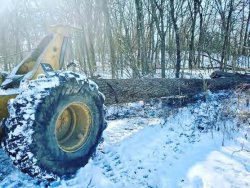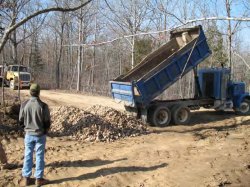AgEBB-MU CAFNR Extension
Green Horizons
Volume 24, Number 1
Winter 2020
Forest Industry
Winter Weather and Wet Soil Conditions Hinder Missouri Logging
By Lynn Barnickol | Missouri Consulting Foresters Association
The storm of January 10, 11, and 12, 2020 produced torrential rain, ice, and snow that saturated soils. Foresters previously reported having timber sales on hold because of wet soils, and the recent precipitation events only magnified the problem of poor logging conditions. The rain and flooding during the summer of 2019 prevented mill yards from receiving the usual supply of logs for the winter, making the current moist soil conditions even more detrimental to the timber supply.
The Old Farmer's Almanac and NOAA Weather Service both predict below normal to seasonal temperatures and precipitation for the winter months of 2020. This offers hope of improved logging conditions, but Missouri weather is, as usual, difficult to predict.
When muddy conditions prevail, logging becomes difficult and can cause ruts which damage tree roots and the soil. The harvest of timber when soils are wet also causes additional maintenance problems for equipment. Hauling from mud-filled landings drags the wet, slick soil onto roads and presents a hazard for drivers. Processing mud-caked logs in the mills can damage the debarker teeth, saws, the carriage set works, chipper knives, and bearings and increase cost of production. Ultimately, muddy logs are friends to no one.
The best hope for improved logging conditions is freezing temperatures that allow some timber harvest to take place. For the logger, it likely means starting early in the morning when the ground is still frozen and quitting by noon when the surface thaws. Adding rock to soft places in forest roads and the entrance to highways can also help to contain mud. If weather and soil conditions do not quickly improve, there will be considerable pressure to get logs to mills or face lay-offs and slow-downs. Perhaps for now, it is best to continue planning for a future harvest but wait for better logging conditions. We can continue with management planning, forest inventories, and marking trees for sale knowing that when the weather breaks, the harvest will be of interest to loggers and mills.
 |
Working on frozen ground reduces the formation of ruts and is less damaging to the soil. Photo credit: Turner Logging, LLC |
 |
To avoid a poor situation later, anticipate wet soil conditions and have road rock delivered prior to hauling logs. Photo credit: Doug Enyart, Clearwater Forest Consultants LLC |
